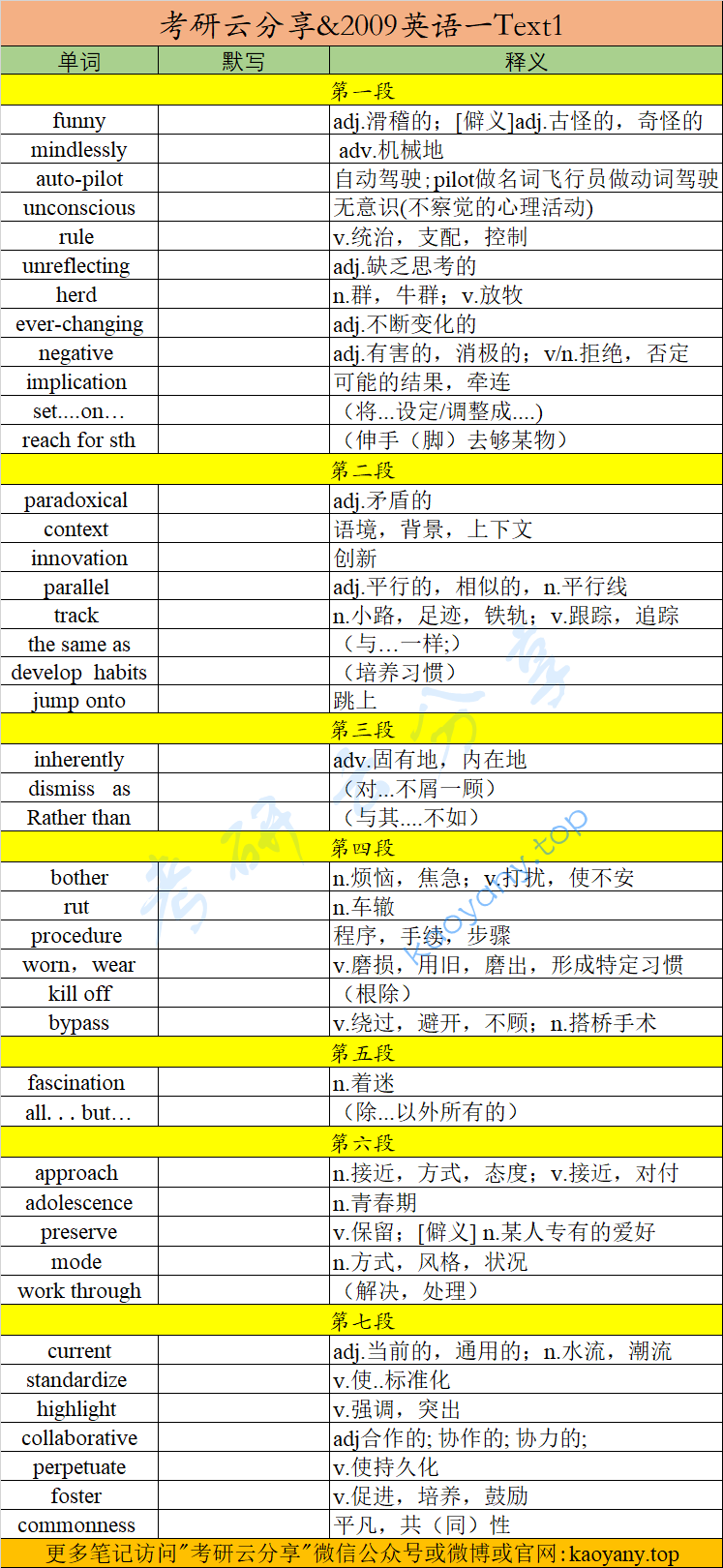第一段
Habits are a funny thing. We reach for them mindlessly, setting our brains on auto-pilotand relaxing into the unconscious comfort of familiar routine. “Not choice, but habit rulesthe unreflecting herd,” William Wordsworth said in the 19th century. In the ever-changing 21st century, even the word “habit” carries a negative implication.
单词&词组搭配
funny [ˈfʌni](出现3次)adj.滑稽的,可笑的;[僻义]adj.古怪的,奇怪的
mindlessly adv.机械地(该单词是在mind后面加个相反意思的后缀less,-ly一般为副词的尾缀,很多单词)
auto-pilot [ˈɔːtoʊ ˈpaɪlət] (合成词)自动驾驶;pilot做名词:飞行员,做动词:驾驶。
unconscious [ʌnˈkɑːnʃəs] 这个单词在05年T3(梦可以被控制)就就大量出现,这个单词翻译比较混乱,既可以翻译为“无意识的”,也可以潜意识(noconscious)”,涉及到心理学范畴,所以也不必深究,翻译为潜意识/无意识都可以,都是没多大注意的,成为一种习惯就好了。
rule (常见词)v.统治,支配,控制
unreflecting adj.缺乏思考的;这个单词是在在reflect前面加一个否定前缀,reflect有个不常见到的意思(仔细考虑)。
herd [hɜːrd](出现2次)n.群,牛群;v.放牧
ever-changing(合成词)adj.不断变化的
negative [ˈneɡətɪv](出现9次)adj.有害的,消极的,负面的,负的;[僻义]v/n.拒绝,否定
implication [ˌɪmplɪˈkeɪʃn](出现12次)含义,可能的结果,牵连;该文章选自《纽约时报》,原文的单词是:connotation [ˌkɑːnəˈteɪʃn] ,命题老师怕大家不认识,特意改成了这个词。
set....on...(将...设定/调整成....)
reach for sth(伸手(脚)去够某物)
本段翻译
习惯是个奇怪的事情,我们可以随意地触及到它,将我们的大脑设定为自动驾巡航模式,轻松地进入对熟悉的日常事物潜意识舒适状态之中。威廉华兹华斯在19世纪曾经说过:“不是选择,而是习惯操纵着缺乏思考的人们”。在不断变化的21世纪,“习惯”这个词甚至带有负面含义。
第二段
So it seems paradoxical to talk about habits in the same context as creativity andinnovation. But brain researchers have discovered that when we consciously develop new habits, we create parallel paths, and even entirely new brain cells, that can jump our trains of thought onto new, innovative tracks.
单词&词组
paradoxical [ˌpærəˈdɑːksɪkl] adj.矛盾的
context [ˈkɑːntekst](出现9次)语境,背景,上下文
innovation [ˌɪnəˈveɪʃn](出现14次)创新
parallel [ˈpærəlel] (出现7次)adj.平行的,相似的(第四段的意思),n.平行线
track [træk](出现8次)n.小路,足迹,铁轨,轨迹,声道;v.跟踪,追踪
the same as(与…一样;)
develop habits(培养习惯)
jump onto(跳上)与jump into(跳进)的区别就是in和on的区别
本段翻译
因此,将习惯与“创新和创造”在同一语境下讨论似乎是矛盾的。但是大脑研究人员已经发现当我们有意识地培养新的习惯,我们的大脑中会生成两条平行的通道,甚至生成新的脑细胞,能使我们的脑回路跳上一个新的、创新的轨道。
第三段
Rather than dismissing ourselves as unchangeable creatures of habit [状语], we [主语] can instead direct [谓语]our own change [宾语] by consciously developing new habits [状语]. In fact,[状语] the more new things[宾语] we[主语] try[谓语] — the more we step outside our comfort zone — the more inherently creative [表语] we [主语] become [系动词], both in the workplace and in our personal lives[状语].
单词&词组
inherently [ɪnˈhɪrəntli](出现8次)adv.固有地,内在地
dismiss as(对...不屑一顾)
Rather than(与其....不如)
本段翻译
与其对自己是一成不变的习惯性生物而不屑,不如我们反而通过有意识地培养新习惯来主动做出改变。 事实上,我们尝试的新事物越多(我们越是走出自己的舒适区),我们就越是在职场上和个人生活中具有内在创造力。
第四段
But don’t bother trying to kill off old habits; once those ruts of procedure are worn into the brain, they’re there to stay. Instead, the new habits we deliberately press into ourselves create parallel pathways that can bypass those old roads.
单词&词组
bother(出现4次)n.烦恼,焦急;v.打扰,使不安,费功夫做
rut [rʌt] n.车辙
procedure [prəˈsiːdʒər](出现10次)程序,手续,步骤
worn,wear的过去式(出现5次)[僻义]v.磨损,用旧,磨出,耐用,形成特定习惯
kill off(根除)
bypass(出现2次)v.绕过,避开,不顾;n.搭桥手术
本段翻译
但是,不要费心设法改掉旧习惯;一旦这些惯有程序印入大脑,它们就会留在那里。相反,我们有意使之根深蒂固的新习惯会创建相似的路径,它们可以绕过原来那些旧路径
第五段
“The first thing needed for innovation is a fascination with wonder,” says Dawna Markova, author of The Open Mind. “But we are taught instead to ‘decide,’ just as our president calls himself ‘the Decider.’ ” She adds, however, that “to decide is to kill off all possibilitiesbut one. A good innovational thinker is always exploring the many other possibilities.”
单词&搭配
fascination [ˌfæsɪˈneɪʃn](出现2次)n.着迷
all。。。but。。。(除...以外所有的)
本段翻译
《开放思维》的作者马尔科娃说:创新需要的首要条件是强烈的好奇心。但是我们却被教导去‘做决定’,正如我们的总统称自己是‘决策者’一样。她又补充道,然而,“做决定是只保留一种可能而将其他可能性全部扼杀。一个出色的创新型思考着却总在探寻着其他多种可能性。”
第六段
All of us work through problems in ways of which we’re unaware, she says. Researchers in the late 1960 discovered that humans are born with the capacity to approach challenges in four primary ways: analytically, procedurally, relationally (or collaboratively) and innovatively. At the end of adolescence, however, the brain shuts down half of that capacity, preserving only those modes of thought that have seemed most valuable during the first decade or so of life.
单词&搭配
approach [əˈproʊtʃ](出现21次)n.接近,同路,方式,态度;v.接近,接洽;[僻义]v.对付,应对
adolescence[ˌædəˈlesns] n.青春期
preserve [prɪˈzɜːrv](出现11次)v.保留,保护,保养;[僻义] n.某人专有的爱好
mode [moʊd](出现10次)n.方式,风格,状况
work through(解决,处理)
本段翻译
他说,我们 都以我们意识不到的方式来解决问题。研究人员在20世纪60年代末发现,人类天生就有使用这四种方法应对挑战的能力:分析法、程序法、相关法(或合作法)和创新法。然而,在青春期结束时,大脑关闭了其中一半能力,只保留了哪些在生命最初大约十年中似乎最有价值的思维方式。
第七段
The current emphasis on standardized testing highlights analysis and procedure, meaning that few of us inherently use our innovative and collaborative modes of thought. “This breaks the major rule in the American belief system — that anyone can do anything,” explains M. J. Ryan, author of the 2006 book This Year I Will... and Ms. Markova’s business partner. “That’s a lie that we have perpetuated, and it fosterscommonness. Knowing what you’re good at and doing even more of it creates excellence.” This is where developing new habits comes in.
单词&搭配
current [ˈkɜːrənt](出现14次)adj.当前的,通用的;n.水流,电流,潮流
standardize [ˈstændərdaɪz] v.使..标准化
highlight [ˈhaɪlaɪt](出现6次)v.强调,突出
collaborative [kəˈlæbəreɪtɪv]
perpetuate [pərˈpetʃueɪt] v.使持久化
foster [ˈfɑːstər](出现2次)v.促进,培养,鼓励
commonness 平凡,共(同)性
本段翻译
目前标准化测试强调的是分析法和程序法,也就是说,我们中很少有人天生就会运用创新和合作的思维方式。Markova女士的商业合作伙伴M.J. Ryan(2006年出版的著作《今年我将……》一书的作者), 她解释说:“这打破了美国信仰体制中的主要原则——任何人可以做任何事。那是我们长久以来的一个谎言,它造就了平庸。了解你擅长什么,而且在这方面多下功夫,这样就会成就卓越。这正是(需要)培养新习惯的意义所在。
5道题目
21. In Wordsworth’s view, “habits” is characterized by being .
[A] casual
[B] familiar
[C] mechanical
[D] changeable.
22. Brain researchers have discovered that the formation of habit can be .
[A] predicted
[B] regulated
[C] traced
[D] guided
23. “ruts”(Line 1, Paragraph 4) is closest in meaning to .
[A] tracks
[B] series
[C] characteristics
[D] connections
24. Dawna Markova would most probably agree that .
[A] ideas are born of a relaxing mind
[B] innovativeness could be taught
[C] decisiveness derives from fantastic ideas
[D] curiosity activates creative minds
25. Ryan’s comments suggest that the practice of standardized testing
[A] prevents new habits from being formed
[B] no longer emphasizes commonness
[C] maintains the inherent American thinking mode
[D] complies with the American belief system
选项单词
casual [ˈkæʒuəl](出现5次)adj.偶然的,随的,漫不经心的
mechanical [məˈkænɪkl](出现7次)adj.机械的
decisiveness [dɪˈsaɪsɪvnəs] n.决定性
derive from(源于)
prevent from(防止。。。)
maintain [meɪnˈteɪn](出现19次)v.维持,维护,固执己见,抚养
comply with(服从,与...一致)
参考答案
CDADA

- 单词 词组搭配
- 本段翻译
- 单词 词组
- 本段翻译
- 单词 词组
- 本段翻译
- 单词 词组
- 本段翻译
- 单词 搭配
- 本段翻译
- 单词 搭配
- 本段翻译
- 单词 搭配
- 本段翻译
- 5道题目
- 选项单词
- 参考答案
